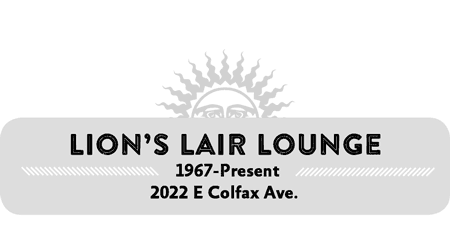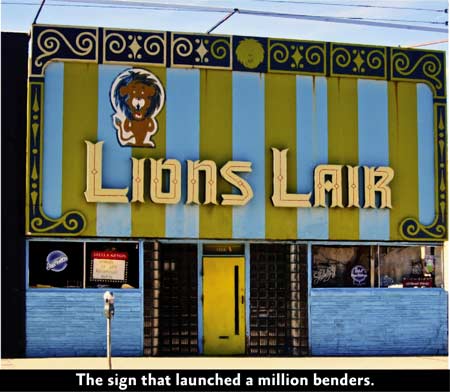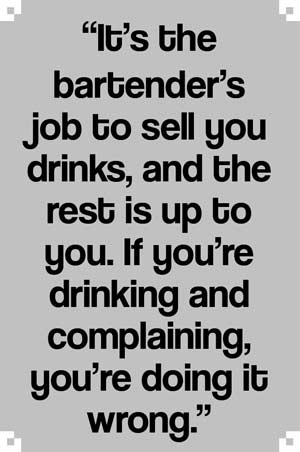“You’re only as good as the bars they let you drink in.”
I don’t remember who muttered those words, or in what dive, or how many years ago, but I do remember the mutterer was taking a dig at a gent who’d just been escorted outside for bad behavior. It’s a valid point.
After you’ve been escorted out enough times, you discover exactly where you belong in the hierarchy of bars, from the upscale and rule-obsessed lounges at the top to the seedy, anything-goes day-worker hovels at the bottom. I found my comfort zone around midway up, in the dives of Denver. At least that’s where I felt most at home and spent most of my time. They were forgiving when things got wild, but also enforced enough rules so that the law didn’t have to get involved.
And now that the great dives of Denver have begun to vanish, for various reasons, it’s high time Modern Drunkard leveled a broad salute to those that have disappeared and those that are hanging on.
Editor Frank Kelly Rich and Senior Writer Luke Schmaltz take the tour.
Frank Kelly Rich: Ah, the Lion’s Lair. Probably Denver’s most celebrated dive. The first Denver bar I drank in. For a long time it was the only bar I drank in.
Luke Schmaltz: When I started the band1 in 1994, this was Live Music Valhalla.
FKR: Not the Cricket?
LS: Anybody who could plug in a guitar and make noise could get a gig at the Cricket. It took a while to crack the code of the Lion’s Lair.
FKR: I started drinking here around that time. The owner back then was old Mr. Lyons, with a Y instead of an I.
LS: Yeaaaah.
FKR: He’d hold court down at the end of the bar. Anyone under 50 was afraid to talk to him. He had this aura of not wanting to waste his time with, you know, the idiot youth.
LS: Yeaaaah. Mr. Lyons of the Lion’s Lair.
FKR: See, now I’m starting to doubt my own story. But you know what? That’s part of the dive canon. That’s number one on the list. A dive should have a deep history. Its past should be shrouded in mystery and legend. True or otherwise.2
LS: Some dives don’t have that.
FKR: Right. Look, this is not just going to be a revisitation of old haunts. We’re going to use each as a yardstick to measure and codify exactly what a dive bar is.
LS: We can do that.
FKR: Who’s going to stop us? Very few dives will check every box. But they should check most.
LS: And we’re going to build those boxes as we go.
FKR: And destroy some. For example, this is a live music dive. And a lot of dives have live music. But live music doesn’t have anything to do with a bar being a dive.
LS: Right.
FKR: You know my origin story with this place.
LS: You’ve told me so many times it gets hazy.
 FKR: Allow me to refresh your memory. I’d been randomly driving around the country in a ‘67 Corvair, hammering out a four-book contract for a series of dystopian-noir adventure novels in various motels. Passing through Denver, I saw the Lair’s fantastic sign. I stopped in for a drink, as was my habit when I spotted vintage bar signs.
FKR: Allow me to refresh your memory. I’d been randomly driving around the country in a ‘67 Corvair, hammering out a four-book contract for a series of dystopian-noir adventure novels in various motels. Passing through Denver, I saw the Lair’s fantastic sign. I stopped in for a drink, as was my habit when I spotted vintage bar signs.
LS: It’s a great sign.
FKR: Fantastic. Now, at first it was the typical retirees at the bar but as the night went on all these strange younger cats started coming in, because it was Boyd Rice’s DJ night. It filled up with goths, punks, weird-beards, fringe dwellers. I was enthralled. I ended up passed out in the backseat of my Corvair. It reopened at 7am, and after bracing myself with a handful of Bloody Marys, I started walking in concentric circles until I found a place for rent three blocks away. I came in here every day like it was my job, and it sort of was because I wrote most of my third book in the booth that used to be right there.
LS: And now we’re sitting in the last booth. The final booth.
FKR: It was a terrible day when they pulled the booths out. I hate it when a dive bar “renovates.”
LS: I stopped in right after they pulled them out. An ancient regular came in, gimped to where his booth used to be, and there was nothing there to catch him. He just sat on the floor. Twenty years of muscle memory and suddenly he was trapped in a weird new reality.
FKR: There was a lot of pushback. Everyone thought they were just callously creating more standing space for the shows, and to counter that there was a constant refrain from the staff that new booths were on their way. But you know what? I don’t think there were ever any booths on the way.
LS: Well, it’s still a dive. A one-booth dive.
FKR: And this is where it all started. The magazine was forged here. This was one of our first ads. This was the unnatural island where we built a kooky raft with the idea of raiding the cultural mainland like pirates.
LS: I played my first gig here in ‘94. In ‘96 I got a job working the door. And that was a wild fucking year, man, because it was a guaranteed fight every night.
FKR: East Colfax was the Wild West back then.
LS: It’s still a little wacky.
FKR: Yeah, but not like it was.
LS: I’d sit at the door and wonder: which one of these fuckers is going to swing at me tonight? It was crazy, and I was a bit of a screwhead, but what was great was every hour on the hour I’d get a beer and a shot. The bartenders knew how shitty it was working the door.
FKR: It’s a good system. The first bartender I met here was Bill. Long gray hair and beard. I know dive bars are famous for surly bartenders, and that should be a dive rule, but he was the surliest of the surly. And not in a crude and aggressive way. Anybody can do that. For him, it was an art form. I’d come in here in the middle of a blizzard, the only customer. He’d be reading his newspaper and every time I ordered a drink he would go through this elaborate routine. He’d finish whatever paragraph he was reading, slowly lower the paper, look at me like he’d never seen me before, sigh mightily, walk slowly over to the taps with an understated insolence, pour the beer, get the money, return to his paper. We’d go through this kabuki every 15 minutes. It was a form of abstract theater, and he performed at the very top of his art, way the fuck up in the most rarefied stratosphere of surliness.
LS: I think I remember him.
FKR: The rumor was he took off with the till one night then fell off the face of the Earth.
LS: I didn’t hear that.
FKR: Another rumor had it he disappeared due to sudden and terminal cancer. To this day I don’t know if either is true.
LS: Bars and bartenders have their own code, they keep a tight lip.
FKR: Deep eddies of mystery and legend. There were two types of bartenders who worked here. There were the hard surly dudes and the slinky junky-chic women who were really attractive but might be on a smack or vegan diet.
LS: Or both. Pale skin, bright colored hair, lots of dark eye shadow, rings on every finger, sharp repartee.
FKR: Yet demure. Then there was that one broad who was a hybrid of the types. Short and stocky with absolutely no interest in suffering fools. First time I met her, there was a day-worker type loudly demanding glasses of water until she got fed up. So she calmly walks around the bar, gets behind him, clamps his arms to his sides and drags him outside. I went out to see if she needed any help but she had already thrown him into the gutter, where he lay unconscious. She also had this system where she’d bribe customers with drinks to throw each other out.
LS: What a gal. What the fuck was her name?
 FKR: Lost in the eddies of mystery and legend. One of the updated Rules of Boozing is, Don’t go to a dive bar if you require fast and friendly service. Everyone involved will be happier.
FKR: Lost in the eddies of mystery and legend. One of the updated Rules of Boozing is, Don’t go to a dive bar if you require fast and friendly service. Everyone involved will be happier.
LS: This is the sort of place that adheres to the old idea that you don’t have to kiss someone’s ass to give them acceptable service. They just give you what you need, which is booze. And that’s it. There’s this new level of ass kissing in the service industry.
FKR: Hasn’t that been going on forever?
LS: Yeah, but it’s been elevated to a fever pitch. People have gotten so used to getting their asses kissed that they’re offended if you’re not falling all over yourself to over-accommodate them. It’s the bartender’s job to sell you drinks, and the rest is up to you. If you’re drinking and complaining, you’re doing it wrong.
FKR: When I go to a bar and they’re overly solicitous, it doesn’t seem like we’re interacting like humans. I don’t like that robotic McDonald’s facade. I don’t like bartenders pretending to be extremely interested in my welfare. It’s undignified. It’s ugly. It’s a lie.
LS: With the disappearance of the dive bars, so too is the disappearance of the really surly antisocial bartender.
FKR: Where do they go? Where else can they get away with that attitude?
LS: A factory assembly line.
FKR: Makes sense. So, what dive rule does the Lair best illustrate?
LS: It checks off most boxes. It has a great jukebox.
FKR: Maybe the best vintage bar sign in Denver.
LS: Old-timers during the day.
FKR: Man, there were a lot of characters back then. There were the fabulists who made up incredibly unlikely stories, and there were those who never lied because they never talked. Hand signals and grunts. There was that little old man who would serenade all the ladies, and the night always ended with him shuffling around with his pants around his ankles. He’d been doing it for so many years they tolerated it. It was part of the fabric of the bar. Nowadays he’d be caged as a sex offender.
LS: The past is a foreign country and all that.
FKR: Dives are the retirement plan for a lot of the working class. Instead of playing golf or going on a walk in the park, their daily routine was showing up at the Lair at 7am and slowly drinking cheap drafts all day. A little conversation, a few flagrant lies, a little jukebox music. A helluva lot better than being stuck in a senior center playing bingo.
LS: Early morning drinkers are a weird breed. Some are third-shift workers, but most are retirees a lifetime of working has wired to get up early. They have to do something.
FKR: And when an established regular got 86’d, which occasionally happened here, it was traumatic as hell for them. You’d seem them down at the Satire or the Squire, back at the bottom of the pecking order, an awful, stricken look on their faces. It’s like getting demoted from senior engineer to apprentice janitor.
LS: There’s always those stories about old regulars who were in here from 7am to 4pm every day, then one of their asshole kids gets the idea they shouldn’t be spending their golden years in a bar. They lock them down and two weeks later they die from misery. Failure to thrive. You take away their only reason for living and they stop living.
FKR: I’d call that patricide. See, this is cool. We’re in a great bar and the only ones here.
LS: I love an empty bar.
FKR: A dive should have dead zones. When you’re young and single you search out wild scenes with lots of girls and noise, but as you get older you learn to appreciate quiet empty bars. It’s the stark contrast that’s so appealing—bars are very social places and when they’re empty there’s a powerful effect. Standing in an empty desert gives you a certain feeling. Standing in an empty stadium is something else entirely.
LS: And without a gang of TVs blaring at you. There’s one in the corner over there, but it isn’t the main focus.
FKR: There has always been one TV at the Lair. Back in the day, it was an ancient set that was always snowy with static, if it was working at all. It was more of a sarcastic totem than an actual TV. I’ve noticed a lot of bartenders prefer TVs.
LS: A good bartender doesn’t need a TV. It’s a crutch.
FKR: Another time a bar is extra appealing is when it’s closed and you’re still here, drinking. There nothing quite like drinking in a bar after-hours.
LS: You only get that in bars where the bartenders really drink. After 2 o’clock their party starts.
FKR: And they get to choose who they want to hang out with. And you always hope you’ll make the cut.
LS: That is a good feeling.
FKR: It’s a great feeling. There’s that time before you lock in that status, and you’re hanging around and you’re either going to get, “Hey Frank, time to go,” or the whispered, “Just move to the back until we get these assholes out of here.” Then you slide into that twilight world and you’re golden. The door is locked and you’re finally on the right side of it.
LS: Not an easy thing to earn.
FKR: And you can’t ask for it. Though there are those who do. They get real helpful at the end of the night, running around picking up glasses and wiping tables, you know, trying to earn it that way. Personally, I find that sort of behavior undignified.
LS: And exhausting. You should earn it by being fun to drink with.
FKR: Right. Or by embedding yourself. That’s another thing that distinguishes dives. They usually have a gopher dude. He’s almost always around, he gets lunch for the bartenders at lunchtime, he runs errands, goes for smokes, he does light handyman work, usually paid in drinks.
LS: The hang-around guy. The Lair has had a lot of those. One of them lived up in the attic, I think.
FKR: I’ve been up there. It was one of the great after-hour privileges to climb up there and gravely examine all the old props from when this was the Playboy Club. Red velvet curtains, old signs. It’s very dusty up there.
LS: Well, he was a dusty guy.
1 Legendary punk band King Rat, which recently celebrated its 25th year in existence.
2 Fact: Mr. John Lyons bought the Aladdin Lounge and changed its name to the Lion’s Lair in 1967.
Next Up: Streets of London Pub











This was a long time ago and I read it again and it laughed again. I’m in the dive bar of life. This comment won’t post I betcha.